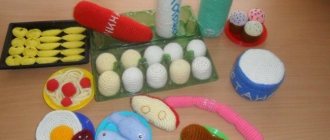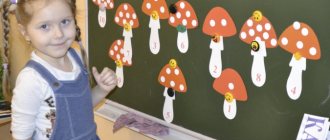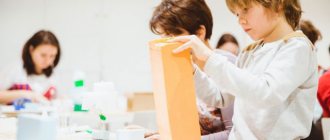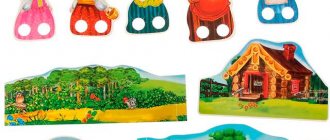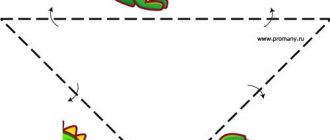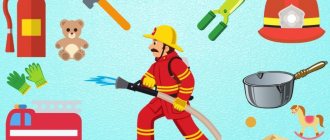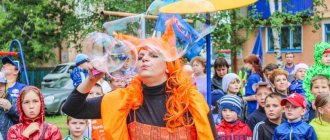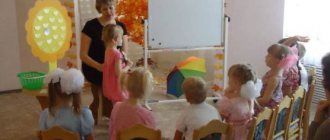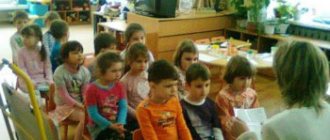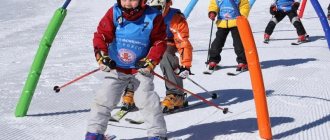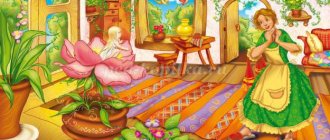Role-playing game "Cafe"
Children:
Let's try to work!
Vos-l:
Tell me, what professions do people work in the cafe?
Children
: administrator, waiter, cashier, cook, cook, security guard, cleaner.
The teacher takes on the role of cafe administrator.
Vos-l:
— What should a cook do in a cafe?
Children:
Cooking, boiling, frying.
Vos-l:
— What is the cashier responsible for?
Children:
He takes money from visitors and gives change.
Vos-l:
— What are the responsibilities of a waiter?
Children:
Politely take orders, bring food, serve tables.
Vos-l: —
What does a cleaning lady do?
Children:
Cleans floors and collects trash.
Vos-l:
Organizers of holidays can also work in cafes, entertaining visitors, playing with them, and organizing various competitions.
Let's decide who will be who in our cafe. We need to distribute roles. For the first time, I will also play with you and take on the role of a cafe administrator. This is a person who greets visitors, seats them at tables and makes sure that they feel comfortable and happy.
Distribution of roles.
Well, it's time for us to go to the cafe.
Vos-l:
guys, every cafe should have a name. Our cafe also has a name, but it is encrypted and we need to unravel it.
Children put together a word from letters, solving the puzzle, and get the word “Friendship”
Voss: And
So, now our cafe is called “Friendship”
Creating a gaming environment.
Children wear overalls and suits.
Visitors take money, wallets, handbags, and go out the door.
Customers enter the cafe.
Administrator
: -We are glad to welcome you to our cafe “Friendship”. Come in, choose a table, place your orders.
The children are seated at the tables. The waiters hand out menus. Visitors read the menu and choose products.
Visitors place orders:
A musical signal sounds.
Administrator:
Today you are greeted by a mischievous presenter - Yagodka.
It turns out, Berry, she is dressed in a bright-colored suit,
- Hello children! I know that you are all smart and resourceful! I invite you to take part in the “Guess the Riddle” competition and win a prize!
Yagodka reads riddles and awards prizes for correct answers.
A beautiful maiden sits in a dungeon, And her braid is on the street. (Carrot)
Angry touchy lives in the wilderness of the forest. There are a lot of needles, but not one thread. (Hedgehog)
They live across the street, but don’t see each other (Eyes) Administrator
-And now a surprise for visitors: a musical moment. Two musicians come out and play musical instruments, the children sing along. The music "Friendship" is playing.
Our next competition is “Sports”.
-Who can name more types of sports?
Children take turns naming sports. The winner receives a prize.
Administrator
-This is where our entertainment program ends. Our first day of work is also coming to an end. Dear visitors, do not forget to pay for your orders.
Attention! Promotion until December 25!
Author: Khozyasheva Valentina Viktorovna
self-analysis of the role-playing game "Cafe Fairy Tale".
I conducted an educational event, a role-playing game “Cafe Fairy Tale”,
in the “Fixies” group of kindergarten 135, the goal of which was to develop children’s ability to act in a real environment when visiting a cafe through the role-playing game “Cafe Fairy Tale”, modeling in this game various actions of people and forms of their behavior.
While holding this event, I set a number of tasks for social – communicative, cognitive, speech, physical, artistic and aesthetic development.
1.Social and communicative
-use knowledge about the surrounding life and attributes in the game in accordance with the plot;
- exercise the ability to understand an imaginary situation and act in accordance with it;
– maintain friendly relationships between children, the desire to play in a group of peers.
2.Cognitive development
- consolidate children’s knowledge about the cafe, its employees and their areas of activity;
-develop a respectful attitude towards people of different professions.
3.Speech development
- to activate children’s speech;
- practice the ability to conduct a dialogue, using forms of politeness in speech.
4.Physical development
- to form in children knowledge about healthy food and its importance for humans;
- develop motor activity.
5. Artistic and aesthetic development
-develop the skills of rhythmic movements in accordance with the nature of the music;
-improve children’s emotional well-being and emancipation.
I believe that I implemented the set goal and solution to the problems in a fairly complete manner.
. This was evidenced, according to my observations and feedback from those present, by the actions, behavior, communication and speech of the children throughout the game. The children were interested, attentive, active, and friendly. Independence was observed in verbal communication with others, they communicated with each other respectfully. When reflecting on the lesson, it was noted that the children who played the role of cafe visitors highly appreciated the work of the cafe representatives and left their wishes in the review book and suggestions in the form of emoticons.
Note
, having analyzed
the methodology for conducting this lesson
,
what contributed to
achieving the goal and solving problems.
Firstly, in my opinion, the gaming,
personality-oriented pedagogical technology was very successfully and correctly chosen.
This technology of role-playing game is fully consistent with the age and psychological characteristics of the children in my group. Moreover, I built the program content of the game in accordance with the requirements of the approximate general education program “From birth to school” edited by N. E. Veraksa, T. S. Komarova, M. A. VasilyevaT, taking into account the age characteristics of children 4 - 5 years old .
Secondly , all methods, techniques and forms of organizing children were chosen in accordance with this technology:
1.Leading method
I chose
modeling and design methods
that were applied at the stage of preparation for the game (we jointly discussed and created a model of a cafe, designed its interior; discussed the behavior patterns of visitors in the cafe, who they were supposed to be; modeled the actions and speech of each of the cafe workers, according to their professions, jointly and individually designed the attributes of clothing of representatives of a particular profession, their speech.).
The children themselves gave the name of the cafe, although they argued a little; it was also good that the children expressed their opinions and came to a common opinion. Then we jointly created coziness in our cafe, decorated the tables, placed vases and napkin holders. The guys told us how to behave in public places. With great pleasure they talked about the people of those professions who work in the cafe and what function they perform.
Implementation
The same developed
models and projects
were undoubtedly implemented during the game.
2. Since my children are preschoolers, I couldn’t do without using the explanatory and illustrative method in
form of conversation and discussion at the stage of preparation for the game, the children had a steady interest in the game, thanks to preliminary conversations, watching video materials, and reading fiction.
3. Undoubtedly, the lesson I conducted was of a personality-oriented nature,
because
-children were given the right to choose. Each child was given the opportunity to realize themselves. The plot roles were distributed according to the wishes of the children.
– not only the desires of the children were taken into account, but also their abilities and capabilities, which significantly increased the children’s self-esteem and created a situation of success
at all stages of preparation and conduct of the game.
-this role-playing game had a strong positive emotional connotation
Due to the children’s acceptance of one or another role they liked, they “lived” the accepted role (and the roles were varied: administrator, cook, waiter, musician, animator, security guard, driver, visitor, correspondent).
And positive emotions are always success, they are always saving health
.
4. Speaking about forms of organizing children's activities
, I would note the following:
–collective
(everyone did a lot together, the success and final outcome of the game depended on the coordinated work of everyone);
– independent
(children and their parents talked about the cafe employees, what they do and what their role is, they thought through the role);
-pairs
(where it was necessary to act out a dialogue, work was done in pairs, for example, a waiter and a customer).
-group (
scene “in a taxi”, conversation with a correspondent, etc.)
Such a variety of used forms of organizing children’s activities contributed to
revitalization, change of children's activities, maintaining a stable interest of children and relieving tension and fatigue, which is important for children.
5. I would like to note the joint work with parents
both in the period of preparation for the plot-role-playing game, and in the process of its implementation (to help make attributes, visit a children's cafe with the children. The role of the newspaper correspondent was taken on by the mother of the pupil Gromova Kristina and played it with great pleasure, interestingly and actorly )
5.Equipment
, which I used in the game
, meets
the aesthetic requirements (tables, tablecloths, vases, badges, attributes, video materials, ICT, etc.) It is bright, colorful, attractive, safe and easy to use. I believe that the use of such attributes in the game is pedagogically justified.
Summing up the results of the self-analysis I conducted for this educational event, I would like to note that play in general in a child’s life, and this one in particular, is of invaluable importance, first of all, for the social development of the child; it reveals for him the meaning of existence in society, the meaning of communication and prepares him for life in society, children learn to independently apply the experience they have gained in the future, making it easier for them to adapt in the future.
For me personally, conducting such an educational event is also an acquired experience, an experience in improving my pedagogical skills and a lesson that I need to conduct role-playing games with preschool children more often in the practice of my work.
Thank you for your attention.
Master class on making attributes for story games “Shop”, “Cafe”
Nikitina Lidiya
Master class on making attributes for story games “Shop”, “Cafe”
Goal: to enrich the subject-developmental environment of the group, so that it contributes to the emergence of story-based games , the development of their game plans, and the opportunity to realize their creative potential.
It is very important to create conditions for preschool children to develop in play activities, so that the subject-development environment in the group contributes to the emergence of story-based play , the development of their play plans, and the opportunity to realize their creative potential. And for this you need appropriate objects, toys and attributes .
3. Double-sided tape, colorless
5. Picture from the laptop “ Cafe ” from MAAM.ru
First, we prepare all the templates of the required shape. Cut out pictures of cakes.
We assemble the design of the cakes and paste the templates with pictures.
When all the cakes were “baked”, I covered them with colorless tape (this is so that later they can be wiped with a damp cloth)
.
This is what we got.
Teaching story-based games to children (part 1) Mastering story-based games occurs in the third year of a child’s life and is of great importance for his mental development. The baby is attracted. Photo report of the joint activities of parents and children to prepare attributes for the game “Cafe” Dear colleagues! I invite you to an exhibition of attributes that were made by the hands of parents and their children. Over many years of work. Master class on making attributes for role-playing games “Cupcakes” Good afternoon, dear colleagues! The dessert theme continues. This evening I decided to make cupcakes. Time, as always, about thirty minutes. Master class on making attributes for the Three Little Pigs theater Good afternoon, dear colleagues! Very often in kindergarten we use theatrical activities for children. Dramatization games, mini-performances. Master class on making attributes for the dance “Easter eggs” Master class “Easter eggs” (attributes for dance) Before each holiday we try to make various attributes for dancing: flowers,...
